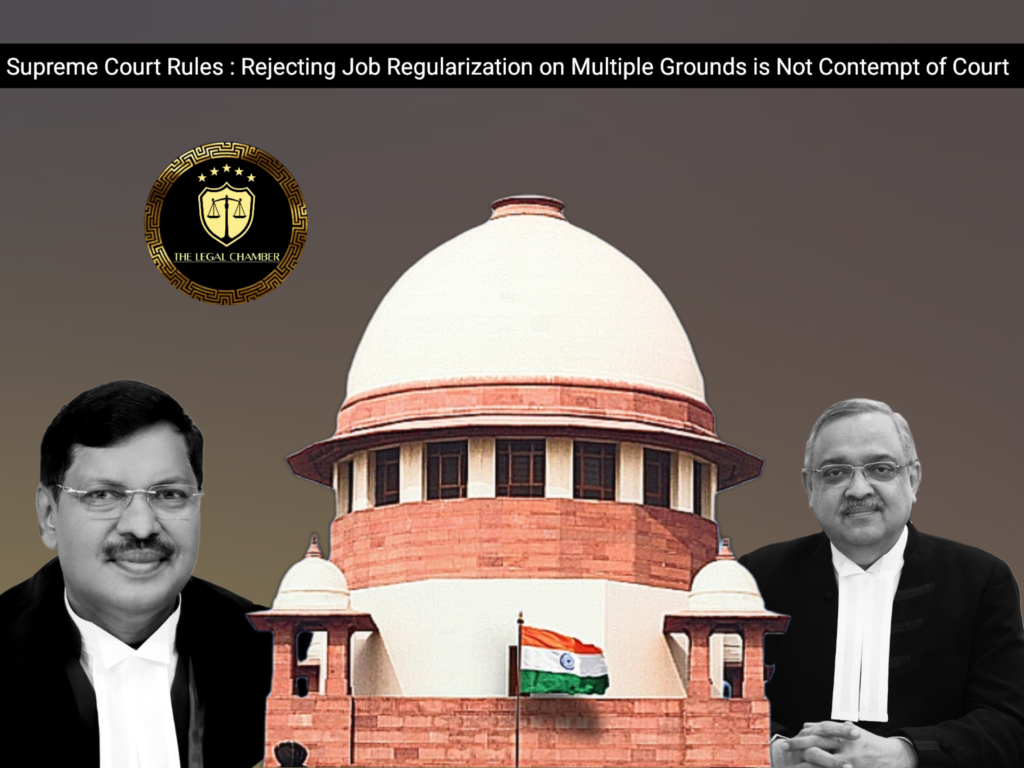
The Supreme Court held that the authority’s order, which rejected regularization claims on multiple fresh legal grounds—including qualifications and financial burden—constituted valid compliance with the High Court’s direction. Since the rejection was not solely based on the prohibited “contract labour” ground, it could not be construed as wilful disobedience amounting to contempt of court.
Facts Of The Case:
The case originated from drivers engaged by the New Okhla Industrial Development Authority (NOIDA) seeking regularization of their services. Their initial representation was rejected by the NOIDA CEO in 2017 solely on the ground that they were intermittent workers hired through a contractor. This rejection was challenged and set aside by the Allahabad High Court in February 2020, which found the order to be non-applicable of mind. The High Court directed the CEO to reconsider the claims afresh, considering all qualifying conditions like cut-off date and qualifications under the relevant 2016 Government Order, but with the specific rider that the claims could not be rejected solely because the drivers were contract labour.In compliance, the CEO constituted a committee and subsequently passed orders in August 2021, rejecting the claims on new grounds including lack of qualifications under the 2016 rules, the applicability of a subsequent 2018 Government Order, and the additional financial burden on NOIDA. Alleging this was contempt of the 2020 order, the drivers filed a contempt petition. The High Court, in an interim order dated October 2021, prima facie found contempt and summoned the CEO, granting a final opportunity for compliance. This interim contempt order was challenged by the CEO in the Supreme Court.
Procedural History:
The procedural history began with the respondents’ initial claim for regularization being rejected by the NOIDA CEO in 2017. This rejection was challenged before the Allahabad High Court in a writ petition. In its order dated February 4, 2020, the High Court allowed the petition, quashed the CEO’s 2017 order, and remanded the matter back to the CEO for a fresh consideration in accordance with the law and specific directions. Following this, the CEO passed new orders in August 2021, again rejecting the claims. The respondents then initiated contempt proceedings before the High Court, alleging disobedience of its 2020 order. The High Court, vide its interim order dated October 6, 2021, prima facie found the CEO in contempt and issued a show-cause notice. It is this interim contempt order that was then appealed to the Supreme Court, which ultimately allowed the appeal and set it aside.
READ ALSO :Supreme Court Quashes Life Ban on Kerala Cricketer, Slams “Non-Transparent” Ombudsman Process
Court Observation:
The Supreme Court observed that the High Court’s 2020 order only mandated a fresh, reasoned consideration of the respondents’ regularization claims and did not pre-ordain a specific outcome. It found that the NOIDA CEO’s subsequent rejection orders, based on independent grounds such as lack of qualifications under the 2016 rules, the applicability of a 2018 government order, and the additional financial burden, constituted valid compliance with the direction, as the rejection was not solely on the prohibited ground of being contract labour. The Court held that such a decision, made after applying its mind to various legal criteria, could not be construed as wilful disobedience amounting to contempt of court. It clarified that if the respondents were aggrieved by the merits of the rejection, their remedy lay in challenging those orders separately, not through contempt proceedings. However, the Court did note that the CEO’s reference to an unrelated stayed SLP was extraneous and directed that portion to be expunged from the orders.
Final Decision & Judgement:
The Supreme Court allowed the appeal and set aside the impugned interim order of the High Court dated October 6, 2021, which had initiated contempt proceedings against the appellant CEO. The Court held that the orders passed by the CEO in August 2021, which rejected the claims for regularization on multiple substantive grounds, constituted due compliance with the High Court’s earlier direction for fresh consideration and could not be treated as contempt of court. However, the Court directed the deletion of a specific ground within those orders that erroneously relied on a stayed Special Leave Petition concerning a different authority. The judgement clarified that the respondents retained the liberty to challenge the merits of the August 2021 rejection orders in appropriate proceedings, and for that purpose, the benefit of exclusion of time under Section 14 of the Limitation Act, 1963 was granted for the period this litigation was pending
Case Details:
Case Title: Ritu Maheshwari, Chief Executive Officer vs. Ramesh Chandra Nagar and Others Citation: 2025 INSC 940 Appeal Number: (Arising out of SLP(C) No. 16848 of 2021) Date of Judgement: July 29, 2025 Judges/Justice Name: B.R. Gavai & Justice K. Vinod Chandran
Download The Judgement Here